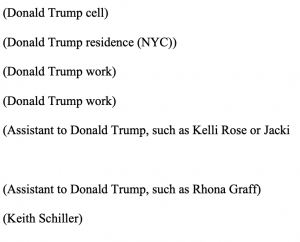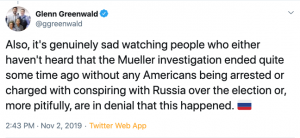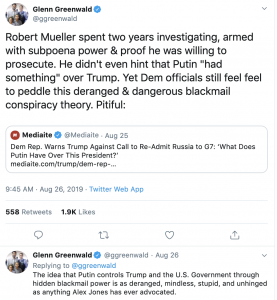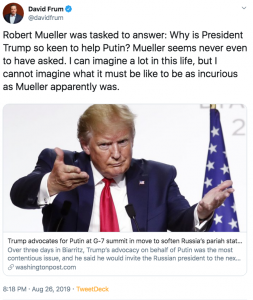In the days since BuzzFeed released a bunch of backup files to the Mueller Report, multiple people have asserted these 302s are proof that Robert Mueller did an inadequate investigation, either by suggesting that the information we’re now seeing is incredibly damaging and so must have merited criminal charges or by claiming we’re seeing entirely new evidence.
I’ve had my own tactical complaints about the Mueller investigation (most notably, about how he managed Mike Flynn’s cooperation, but that might be remedied depending on how Emmet Sullivan treats Sidney Powell’s theatrics). But I have yet to see a complaint that persuades me.
You never know what you can find in the Mueller Report if you read it
Let’s start with claims about how the release revealed details we didn’t previously know. Virtually all of these instead show that people haven’t read the Mueller Report attentively (though some don’t understand that two of the six interview reports we’ve got record someone lying to Mueller, and all are interviews of human beings with imperfect memories). Take this Will Bunch column, which claims that Rick Gates’ claims made in a muddled April 10, 2018 interview reveal information — that Trump ordered his subordinates to go find Hillary emails — we didn’t know.
Rick Gates, the veteran high-level political operative who served as Donald Trump’s deputy campaign manager in 2016, told investigators he remembers exactly where he was — aboard Trump’s campaign jet — when he heard the candidate’s desires and frustrations over a scheme to defeat Hillary Clinton with hacked, stolen emails boil over. And he also remembered the future president’s exact words that day in summer 2016.
Gates’ disclosure to investigators was a key insight into the state of mind of a campaign that was willing and eager to work with electronic thieves — even with powerful foreign adversaries like Russia, if need be — to win a presidential election. Yet that critical information wasn’t revealed in Mueller’s 440-page report that was supposed to tell the American public everything we needed to know about what the president knew and when he knew it, regarding Russia’s election hacking.
The passage in question comes from an interview where a redacted section reflecting questions about what Gates knew in May 2016 leads into a section on “Campaign Response to Hacked Emails.” What follows clearly reflects a confusion in Gates’ mind — and/or perhaps a conflation on the part of the campaign — between the emails Hillary deleted from her server and the emails stolen by Russia. The passage wanders between these topics:
- People on the campaign embracing the Seth Rich conspiracy
- Don Jr asking about the emails in “family meetings
- The campaign looking for Clinton Foundation emails
- Interest in the emails in April and May, before (per public reports) anyone but George Papadopoulos knew of the stolen emails
- The June 9 meeting
- Trump exhibiting “healthy skepticism” about some emails
- The anticipation about emails after Assange said they’d be coming on June 12
- The fact that the campaign first started coordinating with the RNC because they had details of upcoming dates
- RNC’s media campaigns after the emails started coming out
- Trump’s order to “Get the emails” and Flynn’s efforts to do so
- Details of who had ties to Russia and the Konstantin Kilimnik claim that Ukraine might be behind the hack
- China, Israel, Kyrgyzstan
- Gates never heard about emails from Papadopoulos
- Sean Hannity
This seems to be more Gates’ stream of consciousness about emails, generally, then a directed interview. But Gates’ claim that 1) he didn’t know about emails from Papadopoulos but nevertheless 2) was party to discussions about emails in April and May is only consistent with some of these comments pertaining to Hillary’s deleted emails.
Once you realize that, then you know where to look for the “Get the emails” evidence in the Mueller Report: in the description of Mike Flynn making extensive efforts to get emails — albeit those Hillary deleted.
After candidate Trump stated on July 27, 2016, that he hoped Russia would “find the 30,000 emails that are missing,” Trump asked individuals affiliated with his Campaign to find the deleted Clinton emails.264 Michael Flynn-who would later serve as National Security Advisor in the Trump Administration- recalled that Trump made this request repeatedly, and Flynn subsequently contacted multiple people in an effort to obtain the emails.265
264 Flynn 4/25/18 302, at 5-6; Flynn 5/1/18 302, at 1-3.
265 Flynn 5/1/18 302, at l-3.
The footnotes make it clear that in the weeks after Mueller’s team heard from Gates that Flynn used his contacts to search for emails, they interviewed Flynn several times about that effort, only to learn that that incredibly damning effort to find emails involved potentially working with Russian hackers to find the deleted emails. And to be clear: Bunch is not the only one confused about this detail–several straight news reports have not been clear about what that April 10 interview was, as well.
A November 5, 2016 email from Manafort — which the newly released documents show Bannon wanting to hide that Manafort remained a campaign advisor — is another thing that actually does show up in the Mueller Report, contrary to claims.
Later, in a November 5, 2016 email to Kushner entitled “Securing the Victory,” Manafort stated that he was “really feeling good about our prospects on Tuesday and focusing on preserving the victory,” and that he was concerned the Clinton Campaign would respond to a loss by “mov[ing] immediately to discredit the [Trump] victory and claim voter fraud and cyber-fraud, including the claim that the Russians have hacked into the voting machines and tampered with the results.”937
In other words, there is little to no evidence that the most damning claims (save, perhaps, the one that RNC knew of email release dates, though that may not be reliable) didn’t make the Report.
The Mueller Report is an incredibly dense description of the details Mueller could corroborate
The FOIAed documents are perhaps more useful for giving us a sense of how dense the Mueller Report is. They show how several pages of notes might end up in just a few paragraphs of the Mueller Report. The entirety of the three Gates’ interviews released Saturday, for example, show up in just four paragraphs in the Mueller Report: two in Volume I describing how the campaign made a media campaign around the leaks and how Trump once told him on the way to the airport that more emails were coming.

And two paragraphs in Volume II repeating the same information.


Worse still, because the government has released just six of the 302s that will be aired at the Roger Stone trial starting this week, much of what is in those interviews (undoubtedly referring to how Manafort and Gates coordinated with Stone) remains redacted under Stone’s gag order, in both the 302 reports and the Mueller Report itself.
Shocked — shocked!! — to find collusion at a Trump casino
Then there are people who read the 302s and were shocked that Mueller didn’t describe what the interviews show to be “collusion” as collusion, the mirror image of an error the denialists make (up to and including Bill Barr) in claiming that the Mueller Report did not find any collusion.
As I’ve pointed out since March 2017, this investigation was never about collusion. Mueller was tasked to report on what crimes he decided to charge or not, so there was never a possibility he was going to get into whether something was or was not collusion, because that would fall outside his mandate (and the law).
Worse still, in his summary of the investigation, Barr played a neat game where he measured “collusion” exclusively in terms of coordination by the campaign itself with Russia. It was clear from that moment — even before the redacted report came out — that he was understating how damning Mueller’s results would be, because Roger Stone’s indictment (and communications of his that got reported via various channels) made it crystal clear that he at least attempted to optimize the releases, but that involved coordination — deemed legal in part out of solid First Amendment concerns — with WikiLeaks, not Russia, and so therefore wouldn’t be covered by Barr’s narrow definition of “collusion.”
Of late, I’ve found it useful to use the definition of “collusion” Mark Meadows used in a George Papadopoulos hearing in 2018. In an exchange designed to show that in an interview where George Papadopoulos lied about his ongoing efforts to cozy up to Russia his denial that Papadopoulos, the coffee boy, knew about efforts to benefit from Hillary Clinton’s stolen emails, Meadows called that — optimizing the Clinton releases — “collusion.”
Mr. Papadopoulos. And after he was throwing these allegations at me, I —
Mr. Meadows. And by allegations, allegations that the Trump campaign was benefiting from Hillary Clinton emails?
Mr. Papadopoulos. Something along those lines, sir. And I think I pushed back and I told him, I don’t know what the hell you’re talking about. What you’re talking about is something along the lines of treason. I’m not involved. I don’t know anyone in the campaign who’s involved. And, you know, I really have nothing to do with Russia. That’s — something along those lines is how I think I responded to this person.
Mr. Meadows. So essentially at this point, he was suggesting that there was collusion and you pushed back very firmly is what it sounds like. [my emphasis]
One of the President’s biggest apologists has stated that if the campaign did make efforts to optimize the releases, then they did, in fact, collude.
The Roger Stone trial, which starts Tuesday, will more than meet that measure. It astounds me how significantly the previews of Stone’s trials misunderstand how damning this trial will be. WaPo measures that Mueller failed to find anything in Roger Stone’s actions, which is not what even the indictment shows, much less the Mueller Report or filings submitted in the last six months.
The Stone indictment suggests that what prosecutors found instead was a failed conspiracy among conspiracy theorists, bookended by investigative dead ends and unanswered questions for the team of special counsel Robert S. Mueller III.
And MoJo hilariously suggests we might only now, in the trial, establish rock solid proof that Trump lied to Mueller, and doesn’t even account for how some of its own past reporting will be aired at the trial in ways that are far more damning than it imagines.
Here’s why I’m certain these outlets are underestimating how damning this trial will be.
Along with stipulating the phone and email addresses of Erik Prince and Steve Bannon (meaning communications with them could be entered into evidence even without their testimony, though Bannon has said he expects to testify), the government plans to present evidence pertaining to four direct lines to Trump and three to his gatekeepers.

One way prosecutors will use this is to show that, when Trump told Rick Gates that more emails were coming after getting off a call he got on the way to Laguardia, he did so after speaking directly to Roger Stone. They’ll also date exactly when a call that Michael Cohen witnessed happened, after which Trump said the DNC emails would be released in upcoming days got put through Rhona Graff.
It’s not so much that we’ll get proof that Trump lied to Mueller (and not just about what he said to Stone), though we will absolutely get that, but we’ll get proof that Trump was personally involved in what Mark Meadows considers “collusion.”
The Mueller Report and the ongoing criminal investigations
Both Mueller critics and denialists are also forgetting (and, in some cases, obstinately ignorant) about what the Mueller Report actually represented.

We don’t know why Mueller submitted his report when he did — though there is evidence, albeit not yet conclusive, that Barr assumed the position of Attorney General planning to shut the investigation down (indeed, he even has argued that once Mueller decided he could not indict Trump — which was true from the start, given the OLC memo prohibiting it — he should have shut the investigation down).
A lot has been made of the investigative referrals in the Mueller Report, of which just 2 (Cohen and Greg Craig) were unredacted. We’ve seen just one more of those thus far, the prosecution of George Nader for child porn, a prosecution that may lead Nader to grow more cooperative about other issues. Some of the (IMO) most revealing details in the weekend’s dump were b7ABC FOIA exemptions for materials relating to Alexander Nix and Michael Caputo. Normally, that redaction is used for upcoming criminal prosecutions, so it could be that Nix and Caputo will have a larger role in Stone’s trial than we know. But it also may mean that there is an ongoing investigation into one or both of them.
In addition, investigations of some sort into at least three of Trump’s aides appear to be ongoing.
It is a fact, for example, that DOJ refused to release the details of Paul Manafort’s lies — covering the kickback system via which he got paid, his efforts to implement the Ukraine plan pitched in his August 2, 2016 meeting, and efforts by another Trump flunkie to save the election in the weeks before he resigned — because those investigations remained ongoing in March. There’s abundant reason to think that the investigation into Lev Parnas and Igor Fruman and Rudy Giuliani, whether it was a referral from Mueller or not, is the continuation of the investigation into Manafort’s efforts to help Russia carve up Ukraine to its liking (indeed, the NYT has a piece on how Manafort played in Petro Poroshenko’s efforts to cultivate Trump today).
It is a fact that the investigation that we know of as the Mystery Appellant started in the DC US Attorney’s office and got moved back there (and as such might not even be counted as a referral). What we know of the challenge suggests a foreign country (not Russia) was using one of its corporations to pay off bribes of someone.
It is a fact that Robert Mueller testified under oath that the counterintelligence investigation into Mike Flynn was ongoing.
KRISHNAMOORTHI: Since it was outside the purview of your investigation your report did not address how Flynn’s false statements could pose a national security risk because the Russians knew the falsity of those statements, right?
MUELLER: I cannot get in to that, mainly because there are many elements of the FBI that are looking at different aspects of that issue.
KRISHNAMOORTHI: Currently?
MUELLER: Currently.
That’s consistent with redaction decisions made both in the Mueller Report itself and as recently as last week.
It is a fact that when Roger Stone aide Andrew Miller testified, he did so before a non-Mueller grand jury. When Miller’s lawyer complained, Chief Judge Beryl Howell reviewed the subpoena and agreed that the government needed Miller’s testimony for either investigative subjects besides Stone or charges beyond those in his indictment. Indeed, one of the most interesting aspects of Mueller’s statement closing his investigation is the way it happened as Miller was finally agreeing to testify, effectively ensuring that it would happen under DC, not Muller.
Again, these are all facts. No matter how badly Glenn Greenwald desperately wants to — needs to — spin knowing actual facts about ongoing investigations as denial, it is instead basic familiarity with the public record (the kind of familiarity he has never bothered to acquire). At least as of earlier this year — or last week! — there has been reason to believe there are ongoing investigations into three of Trump’s closest advisors and several others who helped him get elected.
At least two of those investigations continue under grand juries, impaneled in March 2019, that Chief Judge Beryl Howell can extend beyond January 20, 2021.
Why Mueller closed up shop
Nevertheless, it is indeed the case that Mueller closed his investigation after producing a report that showed abundant obstruction by the President, but stated that his investigation “did not establish” that the Trump campaign engaged in coordination or conspiracy with Russia, including regarding a quid pro quo.
In particular, the investigation examined whether these contacts involved or resulted in coordination or a conspiracy with the Trump Campaign and Russia, including with respect to Russia providing assistance to the Campaign in exchange for any sort of favorable treatment in the future. Based on the available information, the investigation did not establish such coordination.
I’d like to end this post with speculation, one not often considered by those bitching about or claiming finality of the Mueller investigation.
In his closing press conference, Mueller emphasized two things: he saw his job as including “preserving evidence” against the President, and he noted that under existing DOJ guidelines, the President cannot be charged until after he has been impeached.
First, the opinion explicitly permits the investigation of a sitting President because it is important to preserve evidence while memories are fresh and documents are available. Among other things, that evidence could be used if there were co-conspirators who could now be charged.
And second, the opinion says that the Constitution requires a process other than the criminal justice system to formally accuse a sitting President of wrongdoing.
In Mueller’s explanation of why he didn’t hold out for an interview with Trump, he said that he weighed the cost of fighting for years to get that interview versus the benefit of releasing a report with “substantial quantity of information [allowing people] to draw relevant factual conclusions on intent and credibility” when he did.
Beginning in December 2017, this Office sought for more than a year to interview the President on topics relevant to both Russian-election interference and obstruction-of-justice. We advised counsel that the President was a ” subject” of the investigation under the definition of the Justice Manual-“a person whose conduct is within the scope of the grand jury’s investigation.” Justice Manual § 9-11.151 (2018). We also advised counsel that”[ a]n interview with the President is vital to our investigation” and that this Office had ” carefully considered the constitutional and other arguments raised by . .. counsel, and they d[id] not provide us with reason to forgo seeking an interview.” 1 We additionally stated that “it is in the interest of the Presidency and the public for an interview to take place” and offered “numerous accommodations to aid the President’s preparation and avoid surprise.”2 After extensive discussions with the Department of Justice about the Special Counsel’s objective of securing the President’s testimony, these accommodations included the submissions of written questions to the President on certain Russia-related topics. 3
[snip]
Recognizing that the President would not be interviewed voluntarily, we considered whether to issue a subpoena for his testimony. We viewed the written answers to be inadequate. But at that point, our investigation had made significant progress and had produced substantial evidence for our report. We thus weighed the costs of potentially lengthy constitutional litigation, with resulting delay in finishing our investigation, against the anticipated benefits for our investigation and report. As explained in Volume II, Section H.B., we determined that the substantial quantity of information we had obtained from other sources allowed us to draw relevant factual conclusions on intent and credibility, which are often inferred from circumstantial evidence and assessed without direct testimony from the subject of the investigation.
I take that to mean that Mueller decided to end the investigation to prevent Trump’s refusals to testify to delay the release of the report for two years.
In his testimony, Mueller agreed, after some very specific questioning from former cop Val Demings, that Trump was not truthful in his answers to Mueller.
DEMINGS: Director Mueller, isn’t it fair to say that the president’s written answers were not only inadequate and incomplete because he didn’t answer many of your questions, but where he did his answers show that he wasn’t always being truthful.
MUELLER: There — I would say generally.
She laid out what I have — that Trump refused to correct his lies about Trump Tower Moscow, as well as that he obviously lied about his coordination on WikiLeaks. So lies are one of the things the Mueller Report documents for anyone who reads it attentively.
But Trump’s obstruction extends beyond his lies. His obstruction, as described in the Report, included attempts to bribe several different witnesses with pardons, including at minimum Manafort, Flynn, Cohen, and Stone (those aren’t the only witnesses and co-conspirators the evidence shows Mueller believes Trump bribed with promises of pardons, but I’ll leave it there for now).
So here’s what I think Mueller did. I suspect he ended his investigation when he did because he was unable to get any further so long as Trump continued to obstruct the investigation with promises of pardons. So long as Trump remains President, key details about what are egregious efforts to cheat to win will remain hidden. The ongoing investigations — into Manafort and Stone, at a minimum, but possibly into others up to and including the President’s son — cannot go further so long as any prosecutorial effort can be reversed with a pardon.
That said, some of those details will be revealed for the first time starting this week, in the Stone trial. And, if the Parnas and Fruman influence operation is, indeed, related to Manafort’s own, then Trump’s personal criminal involvement in that influence operation is being revealed as part of a parallel impeachment inquiry.
Which is to say that I suspect Mueller got out of the way to allow investigations that cannot be fully prosecuted so long as Trump remains President to continue, even as Congress starts to do its job under the Constitution. And Congress has finally started doing so.













